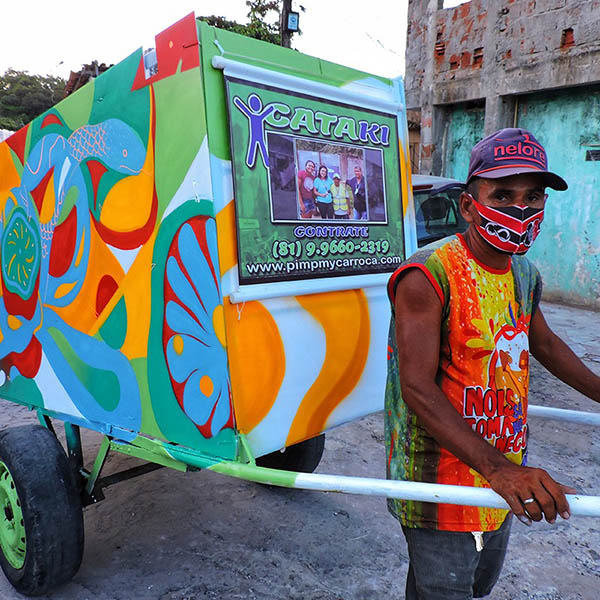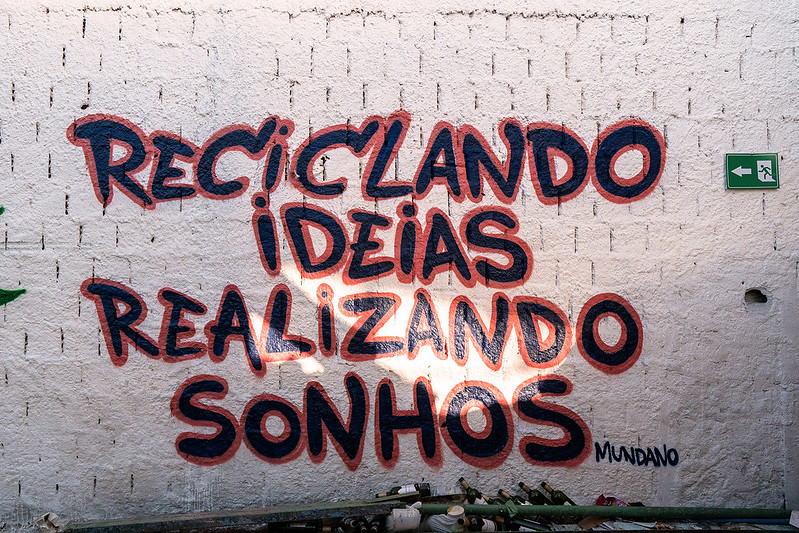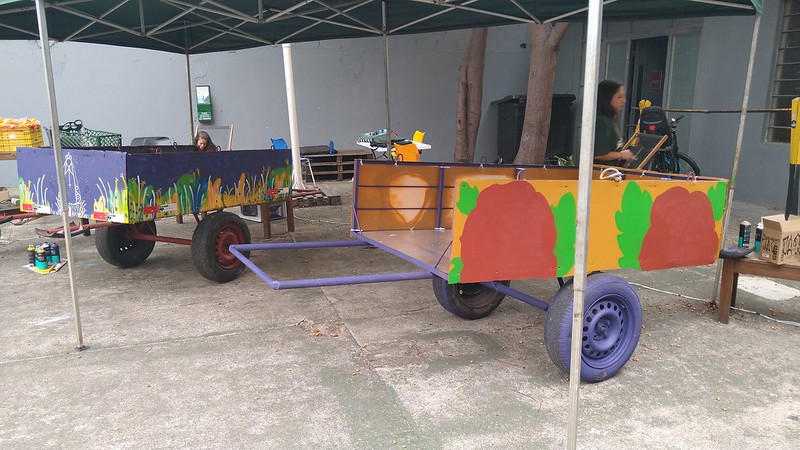A new look at the work of collectors in Brazil
The “Pimp My Carroça” movement works to make visible the work done by recyclable material pickers. Initiative started in 2012 and seeks to increase the income of these workers through art, technology and collective participation.


Credits: Disclosure
By: Gabriel Murga / Lupa do Bem – Favela em Pauta

Brazil recycles only 3% of its waste. This data released by the Brazilian Association of Public Cleaning and Special Waste Companies (ABRELPE), in itself, contrasts with the image that the country has, largely due to the efforts of workers who earn their livelihood from the collection of waste or recyclables. . The 3% open up a reality that contrasts with a symbol of this activity in Brazil, the aluminum can, almost always used to sell beverages and one of the materials with the highest sales value for recycling. However, as a society, this is one of the many products that we discard and are a source of work and income for a hundred Brazilians, including, without a doubt, in the city where you live.
One of the projects that seeks to reverse this scenario is Pimp My Carroça. Created in 2012, the project increases the income of these workers, through art, technology and mainly through collective participation.
According to data from the Institute for Applied Economic Research (IPEA), for every ten objects recycled in the country, nine are done through the work of recyclable material collectors. This highlights another issue: the omission of public authorities, companies and civil society itself. After all, when was the last time you separated organic matter from plastic, indoors? And have you ever stopped to think if your municipality has any partnership between the city hall and recycling cooperatives? Just by sticking to everyday examples, we can see how much lack of visibility and attention to this fundamental issue for society.
One of the excerpts from the manifesto of Pimp My Carroça highlights that the “Movement believes in the practical power of creative and collaborative actions. With no pretensions to deliver ready-made solutions – just like the world, we are in constant transformation. Art is our cart. merit is to recognize the merit of waste pickers, empirical vanguards who are one of the few professions that can beat their chests and say: I am helping to combat environmental collapse. It is no longer about defending nature, but understanding that we are part of it. Waste pickers understood this a long time ago. It’s time for us to learn from them.”
Data from the Anuário Brasileiro de Reciclagem, published in 2020, the largest source of digital information on the work of waste pickers, including an application with information about waste pickers and their role in the recycling chain, mapped 1829 waste picker organizations, with the most of them concentrated in the Southeast, especially in the state of São Paulo with 324 organisations mentioned in this survey.
Most professionals who work with waste are women, and in the south and southeast regions they reach the highest percentage, around 56%. In the Northeast Region, in turn, where the division approaches, there are 51% of female pickers and 49% of pickers, according to yearbook data.


Income disparity in Brazilian regions and possible paths for positive change
Attention is drawn to the income disparity between female and male workers depending on the regions and states of the country where they live. In the southern region of the country, each worker receives an average of R$1,141.00 per month, while in the Northeast region, it is R$651.48, a difference of almost 500 reais.
According to the Inter-union Department of Statistics and Socioeconomic Studies (Dieese), in March this year, Salvador, capital of Bahia, recorded the lowest value for the basic food basket in the country, R$ 461.28. In Florianópolis, capital of Santa Catarina, the highest price was registered, R$ 632.75.
According to estimates by the National Movement of Recyclable Material Collectors, there are between 800,000 and 1,000,000 workers throughout Brazil. The absence of official data is noteworthy, which, according to the Pimp My Carroça Movement, “is a symptom of how much public and private authorities turn a blind eye to waste pickers.”
To enhance the income generation of these workers, Pimp My Carroça created the Cataki app, whose main objective is to connect the waste generator, whether an individual or a company of any size, to the collector, who performs the collection, treating the waste in the same way. more suitable.
It is important to highlight that being on the app allows collectors to receive more calls to collect, highlights the movement’s website that received last year, the Social Entrepreneur of the Year award in Response to Covid-19.
During the pandemic, the main action promoted by Pimp My Carroça was the collective financing Renda Mínima Pros Catadores, which raised more than R$ 1.5 million, distributed among 2,117 recycling professionals, workers responsible for collecting 90% of everything that Brazil recycle.
After collection, the collector takes the waste to a junkyard – it is at this place that he sells his material, receiving an amount corresponding to the value of the kilo of that product. This value varies a lot: it depends on the junkyard, the region of the country and the season.
Despite all this variation, there is something about these values that never changes: they are always very low. The kilo of glass hardly exceeds 5 centavos. Already the kilo of plastic is no more than 20 cents. And a kilo of aluminum cans usually go for at least R$3.50, according to testimonies from pickers and pickers.
“Education for recycling is important, for us to know what to do with our waste and, above all, we take responsibility and become aware of our way of consuming. And the PMC is an ally, as we make civil society aware of the importance of collector’s role in society and we are currently also producing a lot of content about waste”, says Letícia Tavares, director of Management of the movement.
“A good example is Cataflix, a series we produce and is presented by waste pickers. In the series, these waste geniuses explain to us about the types of material, ways of storage, among other very valuable tips. We received dozens of reports from waste pickers and collectors, who, after participating in an event and having the cart paved (renovation with the application of art on the carts), people approach, talk to them, seek to know why the cart is so beautiful. civil service, for a worker, who does urban collection work, essential for the city, but which until then was invisible”, pointed out Tavares.


Each Brazilian produces around 378 kg of waste per year, that is, more than one kilogram per day, according to data from the Brazilian Association of Public Cleaning and Special Waste Companies (ABRELPE).
In addition, every year, due to the lack of public policies, initiatives by private companies and autonomous education that takes into account the importance of reuse and recycling, the country loses R$ 120 billion by burying waste to the detriment of choosing recycle them according to information from the Brazilian Association of Machinery and Equipment Industry (ABIMAQ).
An initiative of recycling in Goiás shows that everyone can collaborate
One of the fundamental points that we need to understand about recycling, reuse and waste, words that need to enter our vocabulary, involves initiative and attitude change.
Goiás, according to the Brazilian Recycling Yearbook, is the state in Brazil with the lowest average income among workers who deal with waste, around R$300.00 per month on average, according to data recorded last year.
It was there that a group of law students from the State University of Goiás mobilized and created the project “Vai catar latinha” with the aim of preserving the environment and raising funds for vulnerable families in Aparecida de Goiânia.
“The initiative arose from the moment we learned that many families in Aparecida de Goiânia would be surviving on just R$150 per month and recycling aluminum cans is the way we developed for everyone to participate. So with the cans collected we are contributing for the environment and the amount collected from sales is reversed in basic baskets for families”, said the project team to Lupa do Bem.
The last collection of this stage by the group will take place on July 30th. And the initiative was supported by a recycling company that donated 20 basic food baskets to support donations. To make donations to the project, just contact us at @vaicatarlatinha on Instagram.

